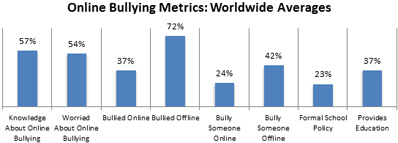Microsoft survey exposes online bullying threat
More than half (54 percent) of children around the world worry about being bullied online, according to a new global survey released today by Microsoft.
Conducted in 25 countries among more than 7,600 children ages eight to 17, the survey focuses on how kids are treating one another online and whether parents are addressing online behaviors.

Globally, the survey found the following:
- Four in 10 children surveyed (ages 8 to 17) say they have experienced what adults might consider online bullying.
- Twenty-four percent of children surveyed say they have done something parents would consider online bullying.
- Five percent of parents engage with their children’s school about online bullying, according to the children surveyed.
The survey also uncovered that children want to talk to parents about the issue, but only 29 percent of kids say their parents have talked to them about protecting themselves online. What’s more, according to the results, there is not one common step taken by parents to address the problem, with only 17 percent having communicated a clear set of rules for negative online behaviors.
“Kids need to know that they can turn to a trusted adult, such as a parent, caregiver or teacher, who will talk to them about all kinds of online safety concerns,” said Jacqueline Beauchere, director, Trustworthy Computing for Microsoft.
In conjunction with the survey results, Microsoft is also releasing two additional resources:
Stand Up To Online Bullying Quiz – This interactive online quiz can be easily downloaded onto an organization’s or school’s website as a teaching tool. It is designed to walk adults through a series of scenarios in which, upon answering, the quiz delivers immediate guidance on how to talk about, identify and respond to the range of online behaviors from online meanness to bullying and beyond.
Digital Citizenship in Action Toolkit. Kids mirror adult behavior — the good, the bad and the ugly. This interactive educational guide helps teach users how to foster responsible use of technology in today’s digital world.